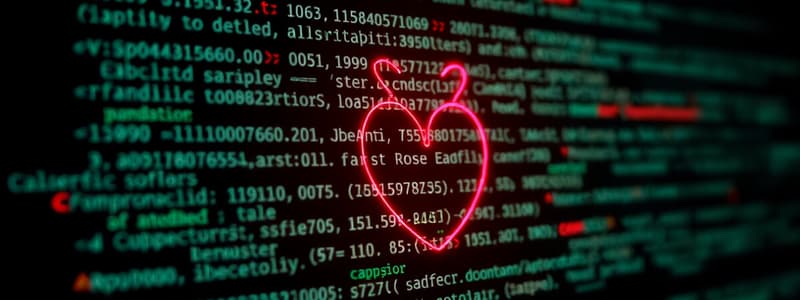Podcast
Questions and Answers
What primarily causes buffer overflows in software applications?
What primarily causes buffer overflows in software applications?
- Handling memory management efficiently
- Using dynamic memory allocation correctly
- Employing secure programming practices
- Allowing the user to enter more data than expected (correct)
Which programming languages are especially prone to buffer overflow vulnerabilities?
Which programming languages are especially prone to buffer overflow vulnerabilities?
- C and C++ (correct)
- Ruby and JavaScript
- Swift and Kotlin
- Java and Python
What can be a worst-case consequence of a buffer overflow attack?
What can be a worst-case consequence of a buffer overflow attack?
- Granting the program extra permissions (correct)
- Increased program performance
- Improving code readability
- Preventing memory leaks
In the context of buffer overflows, what happens when data is written outside an array?
In the context of buffer overflows, what happens when data is written outside an array?
What is a common consequence of reading beyond array boundaries in buffer overflows?
What is a common consequence of reading beyond array boundaries in buffer overflows?
Flashcards are hidden until you start studying
Study Notes
Buffer Overflow Overview
- Buffer overflows are a primary source of software vulnerabilities.
- Type-unsafe languages, such as C and C++, are especially prone to buffer overflow vulnerabilities.
- A buffer overflow occurs when a program allows the user to enter more data than expected, which can lead to modifications in memory.
- At the code level, buffer overflow vulnerabilities typically arise from a violation of programmer's assumptions.
Heartbleed Bug
- The Heartbleed bug, a vulnerability in the OpenSSL library, allowed attackers to access sensitive data from the server's memory.
- The bug caused a security crisis, compromising millions of websites and impacting businesses globally.
- While the Heartbleed bug was patched in 2014, it highlights the importance of comprehensive security measures and proactive vulnerability management.
C-String Buffer Vulnerability
- C-strings are sequences of characters stored in a character array.
- C-strings MUST be null-terminated, indicated by the '\0' character.
- The problem with C-strings is that they lack runtime bounds checking, making them vulnerable to overflow when handling strings.
- Overflow occurs when more data is written to a string than its allocated memory space can hold, potentially overwriting adjacent memory locations.
C++ std::string
- C++ provides the
std::stringclass to manage strings and address some security concerns with C-strings. std::stringuses a pointer to a character array on the heap, which can still be compromised but has built-in security handling in some member functions likeat.- For example, in code demos, replacing subscript
[]operator with theatmember function helps mitigate potential overflow vulnerabilities.
Index-Out-Of-Bounds
- An index-out-of-bounds error occurs when accessing elements in an array outside the bounds of its allocated memory.
- This can be caused by incorrect calculations, logic errors, or user input validation issues.
Off-By-One Errors
- Off-by-one errors occur when a loop iterates one too few or one too many times, leading to incorrect data processing.
- This can be caused by issues in loop termination conditions or incorrect array indexing.
Consequences of Buffer Attacks
- Buffer attacks can result in system crashes, affecting program availability.
- Attackers can exploit vulnerabilities to gain access privileges through arbitrary code execution.
- Buffer overflows compromise data integrity by overwriting sensitive information or altering control flow.
- Attackers might also use buffer overflows to gain access to sensitive data like passwords stored in memory.
Mitigating Buffer Overflow
- Implementing Secure Code: Use bounds checking, input validation, and safe string handling functions to prevent buffer overflows during development.
- Compiler Warnings: Enable compiler warnings to identify potential buffer overflows and other coding issues during compilation.
- Stack Canaries: Adding random values on the stack before functions can detect memory corruption by checking these values at function exit.
- Data Execution Prevention (DEP): Preventing the execution of code in memory locations that are not intended for code execution.
- Address Space Layout Randomization (ASLR): Randomizing the addresses of system components like libraries, making it more challenging for attackers to predict the location of vulnerable code.
Studying That Suits You
Use AI to generate personalized quizzes and flashcards to suit your learning preferences.




